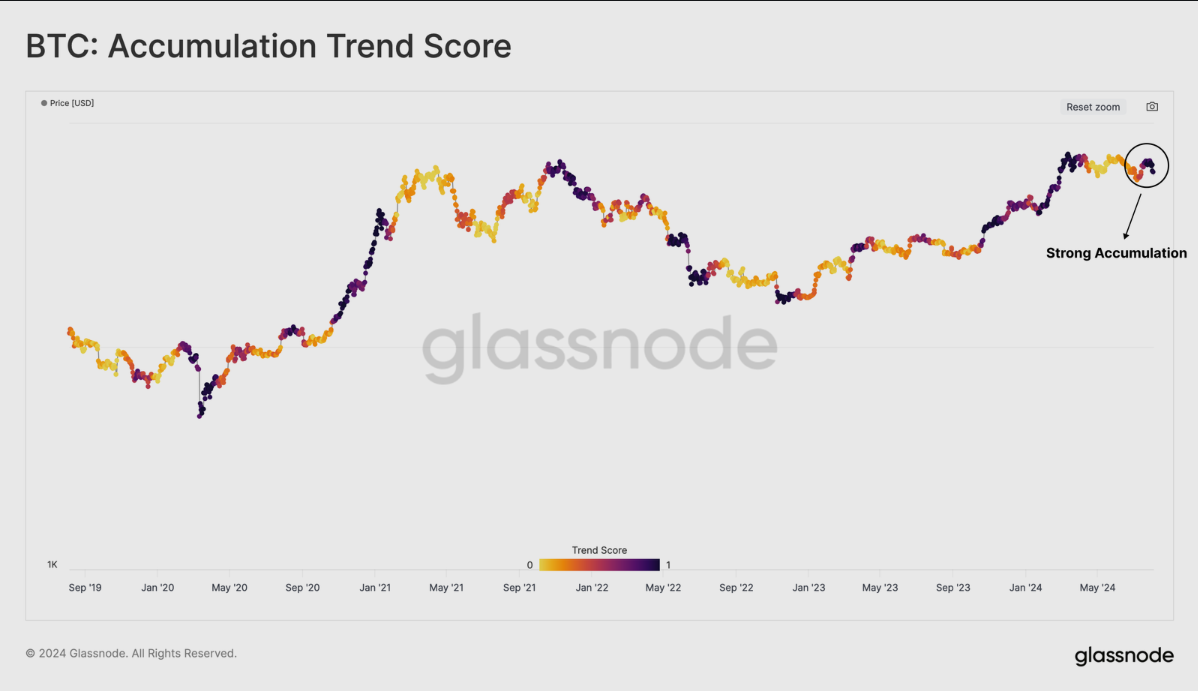Bitcoin Investors Hold Steady Ahead of CPI Data Release
14.08.2024 14:00 1 min. read Alexander Stefanov
Cryptocurrency investors are increasingly holding onto digital assets, especially Bitcoin, as they await the release of the upcoming US Consumer Price Index (CPI) data.
This shift towards accumulation reflects positive investor sentiment and the anticipated impact of the CPI on the crypto market.
On-chain data from Glassnode shows that despite recent volatility, investor confidence in Bitcoin is rising. Large wallet holders, often associated with institutional investors, are significantly increasing their Bitcoin holdings. The Accumulation Trend Score (ATS) has reached its peak, indicating a strong trend toward accumulation.
The market saw significant turmoil last week with $1.06 billion in liquidations due to weak economic data and geopolitical tensions. Despite this, Bitcoin rebounded sharply, trading at $60,806 and contributing to a 2.4% increase in the total crypto market cap, now at $2.23 trillion.
Looking ahead, analysts anticipate that potential Federal Reserve rate cuts could sustain market momentum. Historically, Bitcoin has rallied in response to falling inflation, though recent trends suggest this relationship may be evolving.
Positive long-term prospects for Bitcoin are supported by continued inflows into Bitcoin ETFs and favorable regulatory developments, with over $17 billion in ETF inflows since January bolstering Bitcoin’s price and adoption.
-
1
Elon Musk Unveils His Own ‘America Party,’ Signals Pro-Bitcoin Political Shift
07.07.2025 11:40 2 min. read -
2
Bitcoin Blasts Past $121,000 as Institutions Fuel Rally—Will Altcoins Follow?
14.07.2025 8:15 2 min. read -
3
Bitcoin: What to Expect After Hitting a New All-time High
10.07.2025 14:00 2 min. read -
4
Peter Brandt Issues Cautious Bitcoin Warning Despite Bullish Positioning
10.07.2025 20:00 2 min. read -
5
Vanguard Now Owns 8% of Michael Saylor’s Strategy, Despite Calling BTC ‘Worthless’
15.07.2025 17:09 2 min. read
Global Money Flow Rising: Bitcoin Price Mirrors Every Move
Bitcoin is once again mirroring global liquidity trends—and that could have major implications in the days ahead.
What is The Market Mood Right Now? A Look at Crypto Sentiment And Signals
The crypto market is showing signs of cautious optimism. While prices remain elevated, sentiment indicators and trading activity suggest investors are stepping back to reassess risks rather than diving in further.
What Price Bitcoin Could Reach If ETF Demand Grows, According to Citi
Citigroup analysts say the key to Bitcoin’s future isn’t mining cycles or halving math—it’s ETF inflows.
Is Bitcoin’s Summer Slowdown a Buying Opportunity?
Bitcoin may be entering a typical summer correction phase, according to a July 25 report by crypto financial services firm Matrixport.
-
1
Elon Musk Unveils His Own ‘America Party,’ Signals Pro-Bitcoin Political Shift
07.07.2025 11:40 2 min. read -
2
Bitcoin Blasts Past $121,000 as Institutions Fuel Rally—Will Altcoins Follow?
14.07.2025 8:15 2 min. read -
3
Bitcoin: What to Expect After Hitting a New All-time High
10.07.2025 14:00 2 min. read -
4
Peter Brandt Issues Cautious Bitcoin Warning Despite Bullish Positioning
10.07.2025 20:00 2 min. read -
5
Vanguard Now Owns 8% of Michael Saylor’s Strategy, Despite Calling BTC ‘Worthless’
15.07.2025 17:09 2 min. read



